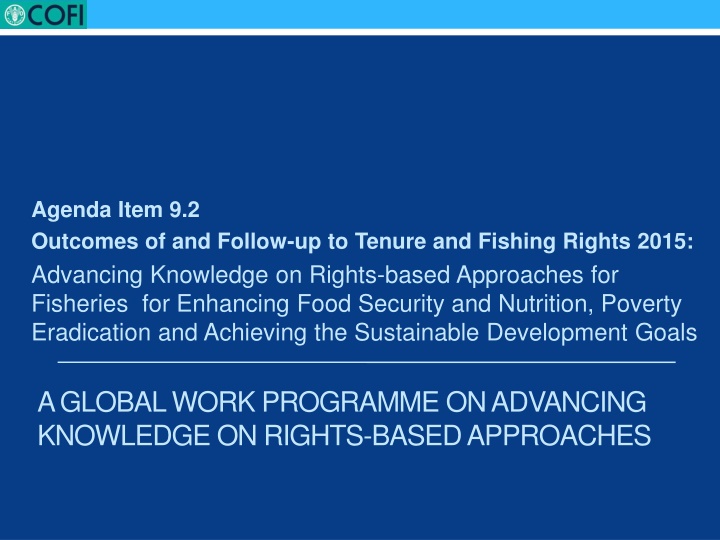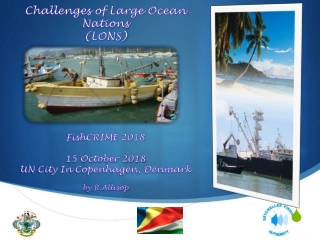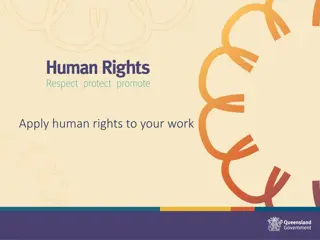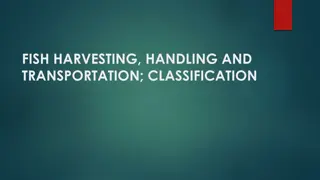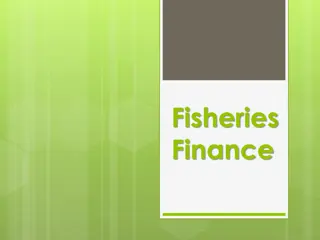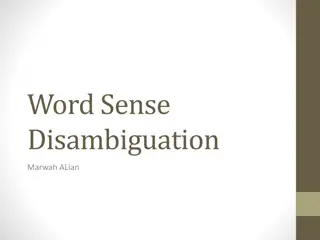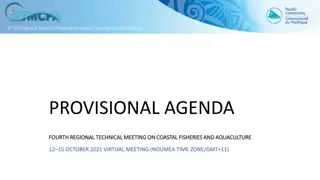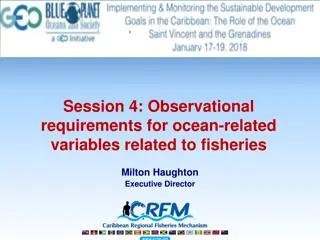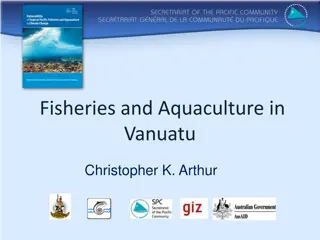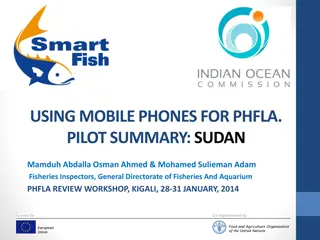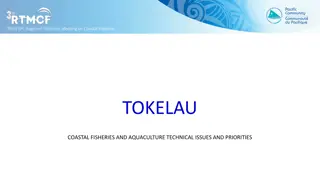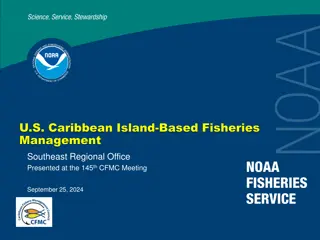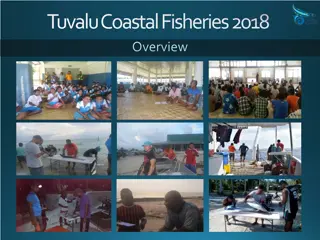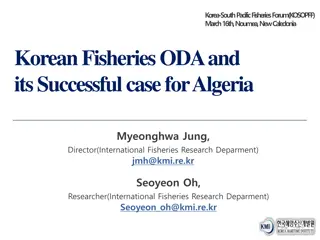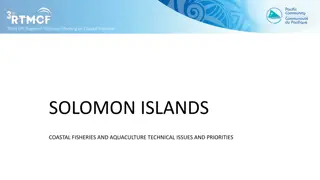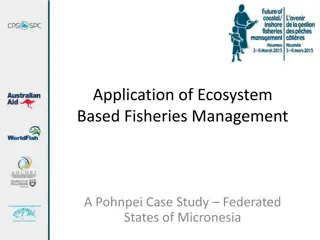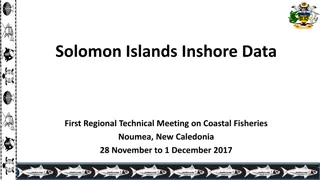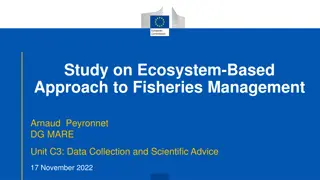Advancing Knowledge on Rights-Based Approaches for Fisheries
This program focuses on advancing knowledge and promoting rights-based approaches in fisheries to enhance food security, poverty eradication, and achieve sustainable development goals. It covers thematic areas like political economy, delineation of rights, capacity development, livelihood enhancement, transboundary rights, and financing.
Download Presentation

Please find below an Image/Link to download the presentation.
The content on the website is provided AS IS for your information and personal use only. It may not be sold, licensed, or shared on other websites without obtaining consent from the author.If you encounter any issues during the download, it is possible that the publisher has removed the file from their server.
You are allowed to download the files provided on this website for personal or commercial use, subject to the condition that they are used lawfully. All files are the property of their respective owners.
The content on the website is provided AS IS for your information and personal use only. It may not be sold, licensed, or shared on other websites without obtaining consent from the author.
E N D
Presentation Transcript
Agenda Item 9.2 Outcomes of and Follow-up to Tenure and Fishing Rights 2015: Advancing Knowledge on Rights-based Approaches for Fisheries for Enhancing Food Security and Nutrition, Poverty Eradication and Achieving the Sustainable Development Goals A GLOBAL WORK PROGRAMME ON ADVANCING KNOWLEDGE ON RIGHTS-BASED APPROACHES
Overview Who: stakeholder driven UserRights 2015, FoUR 2015, Entebbe 2016 and earlier Responding to SSF issues: Human rights-based approach, SSF Guidelines, VGGT What: a coherent framework for facilitating FAO s work on rights-based approaches Where: Small- and large-scale capture fisheries sectors Global, regional and national/local contexts When: on demand How: Putting information within reach Sharing policy expertise Providing neutral platforms for exchanging experiences, knowledge Bringing skills & knowledge to the field
Overview: 6 Thematic Areas 1. Political economy & fisheries governance 2. Delineation of rights & processes for doing so 3. Capacity development 4. Enhancement / diversification of livelihoods 5. Transboundary rights 6. Financing
1. Political economy & fisheries governance Outputs Global Activities Regional Activities National / Local Activities Prepare an inventory of existing rights-based approaches in fisheries under different legal, policy, economic, cultural, environmental settings Organize workshops to collect and exchange information and data relevant for the inventories Support the collection of data and information including traditional knowledge Easily accessible global knowledge base on rights-based approaches Database on existing methodologies, tools and indicators for assessing rights-based approaches Easily accessible database on methodologies, tools and indicators for assessing rights- based approaches Organize workshops to collect and exchange information and data relevant for the database. Identify existing methodologies, tools and indicators Prepare communication materials on existing rights-based approaches and methodologies, tools and indicators for assessing them Disseminate guidelines and easily digestible information among all stakeholders Communication materials on rights-based approaches and ways to assess them Organize workshops on how to integrate the VGGT and SSF Guidelines into policies and legal frameworks Reports from regional workshops Knowledge materials on cross sectoral policy of rights-based approaches in fisheries Provide technical guidance on cross-sectoral policy coherence Hold global conferences for all stakeholders to share perspectives and experiences Reports of global conferences Support creation and engagement of stakeholder organizations in discussions about rights-based approaches Organizations formed and equipped to participate in fisheries governance
2. Delineation of rights, processes Outputs Global Activities Regional Activities National / Local Activities Compile case studies of existing rights- based approaches Baseline scenarios, case studies, gap analyses Document existing types of rights (e.g. access, use, manage, sale) to fisheries resources Map(s) of types of rights to understand the suitability of types of rights in various contexts Support mapping of different types of rights at specific sites Workshop(s) on the access to justice of vulnerable and marginalized groups and how to improve their potential to organize and participate Support mapping of vulnerable and marginalized groups, their access to justice, and their potential to organize Map(s) of vulnerable and marginalized groups Support impact evaluations of other sectors / activities on rights-based approaches in fisheries and vice versa Report(s) evaluating the impact of other sectors / activities on rights- based approaches and vice versa Analyse trade-offs of the elements within a rights-based approach and between different types of rights-based approaches Documentation on trade-offs within and between various types of rights-based approaches Describe, and support the application of existing tools for data collection to enhance the understanding of the state of local resources as a basis for coordinating rights Documentation of tools used to understand the state of the fisheries resource Frameworks, processes and possible actions for supporting national efforts for reforming or strengthening rights-based approaches aligned with the VGGT and SSF Guidelines Develop frameworks, processes and possible actions for supporting national efforts for reforming or strengthening rights- based approaches aligned with the VGGT and SSF Guidelines Meetings to coordinate dialogues between stakeholders, especially with regard to transboundary rights issues Develop and make accessible dispute resolution mechanisms to all stakeholders Support coordinated dialogues between stakeholders within and across sectors Reports on knowledge sharing meetings Mechanisms for dispute resolution accessible to all types of stakeholders Develop and make accessible dispute resolution mechanisms to all stakeholders Provide support for improved access to justice for vulnerable and marginalized groups and individuals. Provide legal advice to all stakeholders
3. Capacity development Outputs Inventory of existing training materials for capacity development Identify capacity development processes (including mechanisms, tools) that may apply to all situations independent from local conditions Set up a platform to share knowledge on successful and unsuccessful capacity development strategies Information materials on best practices for capacity development Global Activities Regional Activities National / Local Activities Conduct inventory of training materials for capacity development Identify and compare local capacity development processes and develop basic descriptive parameters Inventory of local capacity development processes and globally applicable parameters Platform to share knowledge on successful and unsuccessful capacity development strategies Conduct workshops for sharing best practices for capacity development Support the collection of information on best practices for capacity development Hold workshops to developing shared understanding about various topics relating to rights-based approaches. Increased shared understanding of rights-based approaches among stakeholders Increased shared understanding about conflict resolution among stakeholders Hold local workshops and set up platforms for conflict resolution Provide "modern" tools and approaches to support capacities of all stakeholders (in particular fisherfolk) and institutions (e.g. negotiation skills, communication, organization, etc.) Support the development and provision of "modern" tools and approaches for capacity development related to rights- based approaches for all stakeholders and institutions "Modern" capacity development tools for greater understanding of rights-based approaches Support exchange visits for lesson learning Report(s) on exchange visits Providing training materials, trainings, knowledge regarding the processing and use of undervalued products. Conduct regional training seminars and / or workshops Report(s) on training seminars and / or workshops
4. Enhancement/diversification of livelihoods Outputs Global Activities Regional Activities National / Local Activities Socio-economic analyses within and beyond fisheries to understand diversification / enhancement opportunities Socio-economic analyses Prepare inventory of enhancement / diversification of livelihood strategies Support collection of information on livelihood strategies Consult with stakeholders on opportunities for enhancing / diversifying livelihoods Global inventory of livelihood strategies Promote women s involvement in fisheries value-chain and post-harvest activities to promote gender equality Promote women s involvement in fisheries value-chain and post-harvest activities to promote gender equality Report(s) on the role of women in the value chain Comparative analyses of utilization of under-developed resources and by- products Policies on utilization of under- developed resources and by- products Exploration and promotion of feasible enhanced /diversified livelihood strategies through workshops, trainings Exploration and promotion of feasible enhanced /diversified livelihood strategies through workshops, trainings Report(s) of workshops, trainings Facilitate connections between countries and communities regarding the identification and use of under-valued resources Organize workshops to connect socio- economic and environmental experts and potential employers outside the fisheries sector Facilitate connections between countries and communities regarding the identification and use of under-valued resources Report(s) on results of exchange visits, workshops Report(s) of workshops Support dissemination of knowledge on use of self-evaluation tools and participatory toolkits to promote active participation / engagement with stakeholders Support use of participatory toolkits to promote active participation / engagement with stakeholders. Increased active participation / engagement of stakeholders Report(s) on value added products and on undervalued resources Provide tools, support assessments and development of under-valued resources Tools and results of training programmes for livelihood enhancement and diversification strategies Capacity development for livelihood enhancement / diversification strategies (especially for youth) Facilitate exchange visits for lesson learning Report(s) on outcomes of exchange visits Support exchange visits for lesson learning
5. Transboundary rights Outputs Global Activities Regional Activities National / Local Activities Analysis of various right-based approaches used by RFMOs (and RFBs) Report(s) on RFMOs use of rights-based approaches Analysis of allocations between artisanal, national and international fleets Comparative analyses of transboundary rights allocations, issues and solutions Reports on allocation issues and lessons learned Development of tools to evaluate and assess trade-offs (economic, social-environmental, food security) of foreign fishing versus domestic production Evaluation tools Workshop(s) on transboundary rights Facilitate discussions about transboundary issues, solutions Report(s) of workshop(s) on transboundary rights
6. Financing Outputs Report(s) on financing experiences and access to finance related to rights-based approaches Global Activities Regional Activities National / Local Activities Global comparative analysis of financing of rights-based approaches Analysis of how rights-based approaches are financed Support consideration of payments for ecosystem services (PES) to communities for the protection of ecosystems Collection of data on stocks to help determine the value of right(s) Documentation of payments for ecosystem services (PES) Analysis of investment impacts on various stakeholders Develop mechanisms for payment for management responsibilities / services assumed by fishers, fishing organizations, communities (e.g., enforcement, data collection) Analyse the possibilities for facilitating access to support systems (e.g. social services) and financial resources (e.g. credit) Case studies Report(s) on mechanisms for payments for fisheries management services Report(s) on social support systems and accessible financial resources Identification of financial partners and mechanisms for financing rights-based approaches at various levels Facilitate improved accessibility of financial resources to fisheries institutions, fishery organizations and fisherfolk Facilitate improved accessibility of financial resources to fisheries institutions, fishery organizations and fisherfolk Report(s) describing potential financial partners and mechanisms Organize workshop(s) to bring fisherfolk and other fisheries stakeholders together with financial experts Organize workshop(s) to bring fisherfolk and other fisheries stakeholders together with financial experts Organize workshop(s) to bring fisherfolk and other fisheries stakeholders together with financial experts Report(s) of workshop(s) Support development of licensing systems and licenses that cannot be manipulated / counterfeited Analyses of various pressures driving IUU fishing Licenses that cannot be manipulated Improved knowledge of accounting and implications related to rights-based approaches Develop and disseminate knowledge on financial issues related to rights-based approaches Facilitate increased accessibility to financial resources for fisherfolk (e.g. funds, bonds, micro-credits, loans) Facilitate local understanding of and accessibility to financial resources (e.g. funds, bonds, micro-credits, loans) Improved capacity to access financial resources
Suggested action by the Committee Provide information, feedback Recent activities regarding rights-based approaches in fisheries Advise on future support Potential extra-budgetary funding Comment on content & provide recommendations Principles and thematic areas identified to date Priority activities Additional thematic areas and activities
QUESTIONS? COMMENTS? Thank you!
A GLOBAL WORK PROGRAMME ON ADVANCING KNOWLEDGE ON RIGHTS-BASED APPROACHES Agenda Item 9.2 Outcomes of and Follow-up to Tenure and Fishing Rights 2015: Advancing Knowledge on Rights-based Approaches for Fisheries for Enhancing Food Security and Nutrition, Poverty Eradication and Achieving the Sustainable Development Goals
1. Political economy & fisheries governance Putting information within reach Easily accessible global knowledge base on rights-based approaches Easily accessible database on methodologies, tools and indicators for assessing rights-based approaches Communication materials on rights-based approaches and ways to assess them Sharing policy expertise Reports from regional workshops Knowledge materials on cross sectoral policy of rights-based approaches in fisheries Providing neutral platforms for exchanging experiences, knowledge Reports of global conferences Bringing skills & knowledge to the field Organizations formed and equipped to participate in fisheries governance
2. Delineation of rights, processes Putting information within reach Baseline scenarios, case studies, gap analyses Map(s) of types of rights to understand the suitability of types of rights in various contexts Map(s) of vulnerable and marginalized groups Report(s) evaluating the impact of other sectors / activities on rights-based approaches and vice versa Documentation on trade-offs within and between various types of rights-based approaches Documentation of tools used to understand the state of the fisheries resource Sharing policy expertise Frameworks, processes and possible actions for supporting national efforts for reforming or strengthening rights-based approaches aligned with the VGGT and SSF Guidelines Providing neutral platforms for exchanging experiences, knowledge Reports on knowledge sharing meetings Mechanisms for dispute resolution accessible to all types of stakeholders Bringing skills & knowledge to the field Provide legal advice to all stakeholders
3. Capacity development Putting information within reach Inventory of existing training materials for capacity development Inventory of local capacity development processes and globally applicable parameters Platform to share knowledge on successful and unsuccessful capacity development strategies Providing neutral platforms for exchanging experiences, knowledge Information materials on best practices for capacity development Increased shared understanding of rights-based approaches among stakeholders Increased shared understanding about conflict resolution among stakeholders Bringing skills & knowledge to the field "Modern" capacity development tools for greater understanding of rights-based approaches Report(s) on exchange visits Report(s) on training seminars and / or workshops
4. Enhancement/diversification of livelihoods Putting information within reach Socio-economic analyses Global inventory of livelihood strategies Report(s) on the role of women in the value chain Policies on utilization of under-developed resources and byproducts Sharing policy expertise Report(s) of workshops, trainings Providing neutral platforms for exchanging experiences, knowledge Report(s) on results of exchange visits, workshops Report(s) of workshops Bringing skills & knowledge to the field Increased active participation / engagement of stakeholders Report(s) on value-added products and on undervalued resources Tools, results of training programmes for livelihood enhancement and diversification strategies Report(s) on outcomes of exchange visits
5. Transboundary rights Putting information within reach Report(s) on RFMOs use of rights-based approaches Reports on allocation issues and lessons learned Evaluation tools Providing neutral platforms for exchanging experiences, knowledge Report(s) of workshop(s) on transboundary rights
6. Financing Putting information within reach Report(s) on financing experiences and access to finance related to rights- based approaches Documentation of payments for ecosystem services (PES) Case studies Report(s) on mechanisms for payments for fisheries management services Report(s) on social support systems and accessible financial resources Sharing policy expertise Report(s) describing potential financial partners and mechanisms Providing neutral platforms for exchanging experiences, knowledge Report(s) of workshop(s) Bringing skills & knowledge to the field Licenses that cannot be manipulated Improved knowledge of accounting and implications related to rights-based approaches Improved capacity to access financial resources
